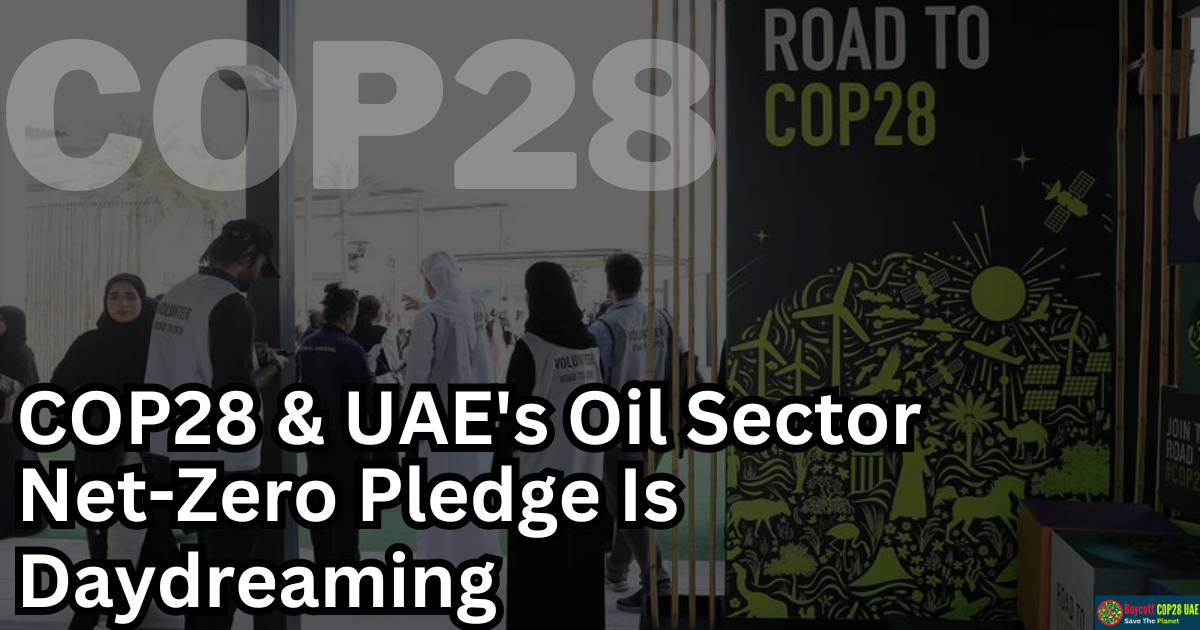As the world stands on the brink of COP28, global attention is laser-focused on the climate crisis, an issue of undeniable urgency. With rising temperatures, increasingly frequent extreme weather events, and ecosystems on the brink of collapse, there’s a growing clamor for solutions. However, amidst this tumultuous backdrop, a surprising announcement has emerged: Over 20 oil and gas companies are pledging to achieve net-zero emissions by 2050. This revelation, championed by COP28 President Sultan Al-Jaber, who also leads the United Arab Emirates’ oil giant ADNOC, has raised eyebrows and spurred intense debates about the sincerity of the UAE and the fossil fuel industry in addressing climate change.
Sultan Al-Jaber’s call for the energy industry to join the climate change battle is not without controversy. His dual role as the head of ADNOC, a major player in the oil sector, and as the
president of COP28 has ignited concerns about conflicts of interest and the true commitment to a sustainable future. During his address at an oil and gas conference in Abu Dhabi, Al-Jaber made a strong case for a profound transformation in the energy sector to effectively combat climate change.
His words resonate with the growing urgency of climate action. Still, many remain skeptical about whether oil companies, historically associated with exacerbating the climate crisis, will genuinely contribute to its solution.
Jaber’s announcement came with three key commitments from the oil and gas industry: aligning with the goal of achieving net-zero emissions by 2050, reducing methane emissions, and eliminating routine flaring by 2030. These commitments sound promising on the surface, but closer scrutiny is warranted.
First and foremost, the commitment to achieving net-zero emissions by 2050 raises questions about the feasibility and accountability of such a goal. The concept of net-zero emissions implies that equivalent removals from the atmosphere must offset any emissions produced. This is a monumental task, and the critical question is whether oil companies can genuinely transition their operations to such an extent that they become carbon-neutral within three decades. The vast scale and complexity of the global oil and gas industry only add to the skepticism surrounding these pledges. Can the industry that has been a significant contributor to carbon emissions for decades pivot so dramatically in a relatively short time frame?
Secondly, the promise to reduce methane emissions is essential in the war against global warming. Methane is a potent greenhouse gas, and curbing its emissions is crucial to preventing further temperature increases. However, the devil is in the details. Will these oil and gas companies establish strict enforcement and monitoring procedures to ensure compliance with their commitments? It is not enough to make promises; substantial and verifiable action is needed to significantly reduce methane emissions. Transparency and accountability in these efforts are paramount.
Lastly, the commitment to eliminate routine flaring by 2030 is commendable. Flaring is a source of emissions and a wasteful practice that squanders valuable resources. However, as with the other commitments, the proof will be in the execution. Will these companies take meaningful steps to end routine flaring, or will they continue to prioritize profit over the health of the planet? It is not enough to make pledges; concrete actions and transparent monitoring are essential to ensure these promises are fulfilled.
Sultan Al-Jaber’s dual role as the head of ADNOC and the President of COP28 has led to accusations of conflicts of interest, and some critics argue that this duality may compromise the UAE’s commitment to addressing the climate crisis. The UAE, a nation that heavily relies on oil revenues, is caught in a delicate balancing act between its economic interests and its obligations as a worldwide leader in the fight against climate change. Questions persist about whether the UAE and its oil industry are committed to reducing emissions and transitioning to a sustainable, low-carbon future.
The world is watching closely as COP28 approaches, and the actions of the UAE and the oil and gas industry will be under intense scrutiny. While Sultan Al-Jaber’s call for a transformation of the energy sector and the commitments made by oil and gas companies are undoubtedly steps in the right direction, the credibility of these promises remains a topic of debate. It is essential that these commitments are backed by concrete actions, stringent monitoring, and transparent reporting to ensure that the fossil fuel industry becomes a genuine partner in the fight against climate change rather than a mere contributor to the problem.






